Postcards from the Prairie: Heat, Hustle, and Heart at Unbound Gravel
Four days, countless soundbites and story drafts, and one dusty finish line that reminded me why I love cycling journalism.
Dear cycling fans,
I didn’t race Unbound Gravel—but I showed up early, stayed late, and lived every gritty second from the other side of the tape. This isn’t a race recap. It’s a field report. And a reminder of why I keep doing this work, even when it leaves me sunburned, sleep-deprived, and still somehow completely alive.
I hope you enjoy the read.
–Rosael
Postcards from the Prairie: My Four Days Inside Gravel’s Craziest Week
Unbound Gravel is known for at least three things: its brutal distances and unpredictable weather, its uniquely tight-knit community atmosphere, and the hype that surrounds it, making it the most prestigious race in the gravel world. Also called the “Super Bowl of gravel,” the event always goes big and is easily the most iconic and influential on the calendar. A win here can define a rider’s career, and it’s a key target for privateers, pros, and sponsors alike. While it was once the domain of solo dreamers and DIY setups, it now draws trade teams and a new layer of tactical complexity to the elite races.
Of course, it hasn’t all been clean lines and neutral feeds. Unbound has a murky past, including a former, offensive name that prompted rightful backlash and a long-overdue reckoning. But if there’s one thing that also defines this race, it’s the organizers’ willingness to evolve. Year after year, they’ve shown a real openness to feedback from racers, locals, fans, media, and content creators—and, more importantly, a consistent effort to follow through. We’ve seen meaningful changes: a separate women’s start, no-drafting rules, non-binary and paracycling categories, improved safety measures, better live coverage, and more.
No, it’s not perfect. There’s still plenty of work to do on affordability, trans athlete inclusion, finish-line safety, and yes, live streaming. But having covered the event twice in person, remotely in other years, and followed it as a fan since the days of Ted King and Alison Tetrick’s wins, I’ve watched it evolve in real time. I even remember a previous attempt at live streaming—one that barely registers in the headlines today. And while there are certainly race organizers out there doing their best to improve, I’ve also seen firsthand how rare that kind of effort and follow-through can be. So when I say Unbound is listening and trying, I mean it. And that counts for something.
Anyway, let me step off this tiny soapbox and tell you what this newsletter is really about. Landing my first assignment with CyclingNews was a big deal for me, and I felt the need to put my personal experience down on paper because the events of the weekend touched me in ways I didn’t expect. As a laid-off editor trying to carve out a path as a freelance cycling journalist, those four days in Emporia became something of a symbolic, maybe even literal, arrival. A homecoming. A rare moment of clarity in a profession not exactly known for stability. I left knowing, with absolute certainty, that if I get my way, this is exactly what I want to do.
Much like 92-year-old Fred Schmid showing up for his fourth Unbound, I hope to keep coming back too—press badge swinging from my neck, maybe in a zip-up tracksuit and orthopedic sneakers—ready to ask the XL winner, “So, tell me… what unfolded in the last 17 hours?” in my best gravel-seasoned Barbara Walters voice, and maybe get a tired laugh as they realize just what they’ve pulled off.
Now, let’s rewind to the beginning.
Thursday: Landing, Expo Wandering, and Tom Dumoulin Fan Mode
I landed at Kansas City Airport around midday, picked up my rental car, and drove two hours south through the rolling green to Emporia, with my body already bracing for the work ahead. This year, I stayed right in town, at a University of Kansas sorority house turned race-week lodging. The setup was bare-bones but wholesome: bunk beds, hallway plastic wrap to protect the carpet from dirty bikes, a communal bathroom with stalls and showers, and a homemade pasta dinner penciled in for Friday night.
My assigned room was Gamma. A handmade sign on the door read “Welcome Izzy & Rosael.” Inside: two bunk beds, beige walls, and the unmistakable scent of communal living. It felt like stepping back into my dorm at FIT, except now I had a press badge instead of a sketchpad. The staff greeted me with warm smiles and iced tea. I dropped my bags, refreshed my sunscreen, and headed to the Expo.
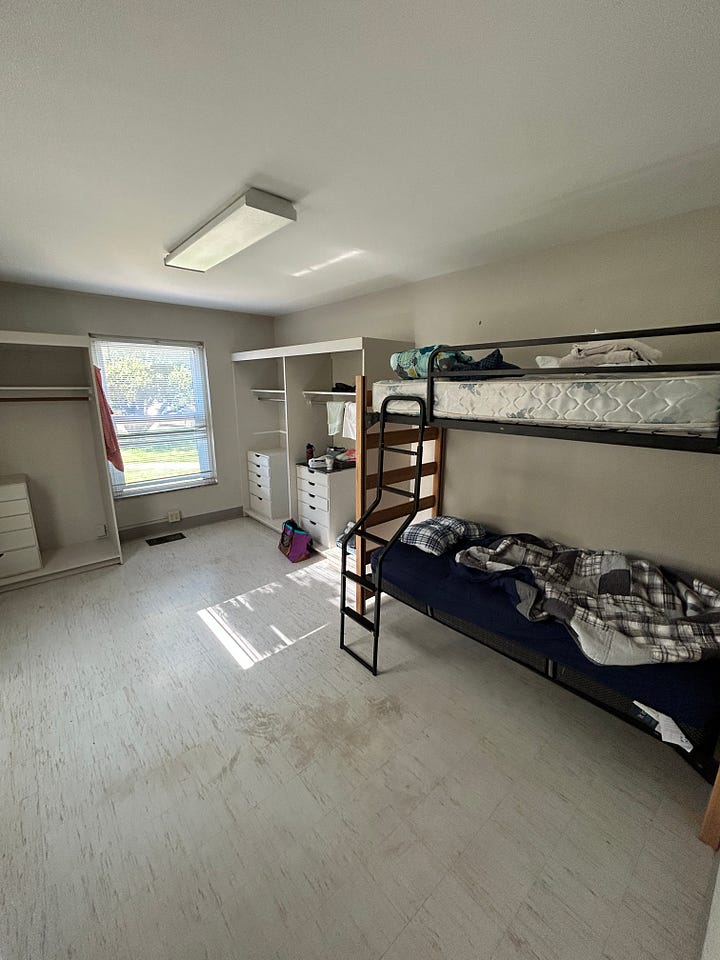
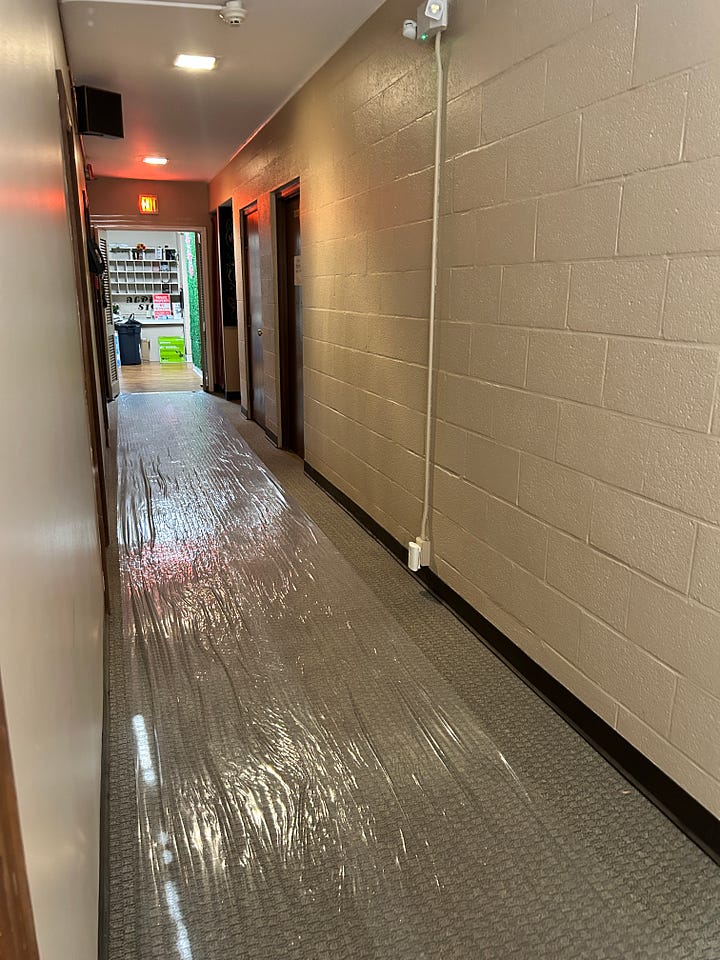
By 2 p.m., the grounds were buzzing—riders spinning past sponsor tents, volunteers hammering signs into rain-softened grass, and clusters of fans stopping to ooh and ahh at pro riders chatting or signing autographs. Everywhere you looked, there was shiny new gravel and road gear on display. I wandered through the layout like a reporter on recon, taking mental notes: where the teams were posted up, where to duck for shade, and how long it might take to hustle from the start line to the media center.
I texted Josh Croxton, CyclingNews’ tech editor, to say hi. It was his first Unbound—and first U.S. trip, I think. Josh turned out to be tall, soft-spoken, and graciously British. He was running on jet lag and curiosity: perfect energy for a tech guy at a gravel race.
I wandered into the Giant/Liv athlete panel already in progress, moderated by Yuri Hauswald. Melisa Rollins, Brendan Johnston, and Tom Dumoulin were on stage, fielding audience questions with a mix of ease and amusement. I caught up with live mechanic Paige Stuart, and afterward, Tom lingered by the Giant booth, and I decided to shoot my shot. I introduced myself—fangirl voice barely suppressed—and told him how much I admired the joy he seemed to be finding again in riding. Then I switched into reporter mode.
He had crashed the day before on a recon ride—loose gravel, low focus, and a body still not feeling 100%. But he wasn’t rattled. “I try to remind myself… It’s not about performance,” he said. “It’s just about me enjoying the bike.”
It felt surreal to chat casually with a former Giro d’Italia winner while Stage 19 of this year’s Giro was happening back in Italy. “I’m rooting for Del Toro today,” he said, eyes lighting up. “I just visited Mexico recently and really hope he does well. That kid is exciting.”
We talked about burnout, the shift in identity after pro racing, and the strange thrill of gravel’s looseness. “Now it’s not about numbers, not about results. It’s just fun again,” he said, smiling. “Talent needs training,” he added with a shrug. “And I don’t really train anymore.”
He marveled at the grassroots vibe of Unbound. “It’s like the unofficial world championship of gravel,” he said. “But also, I feel like I’m just part of a big gran fondo, with a number on.”
These days, his life still revolves around bikes, just on his own terms. He does commentary for Dutch television, serves as an ambassador for Giant, and even performs a theater show in the Netherlands based on his memoir. “It’s kind of fun,” he said. “I go up on stage and talk for nearly two hours about my career—the highs, the lows, and what I learned from all of it.”
I asked for a selfie. Obviously.
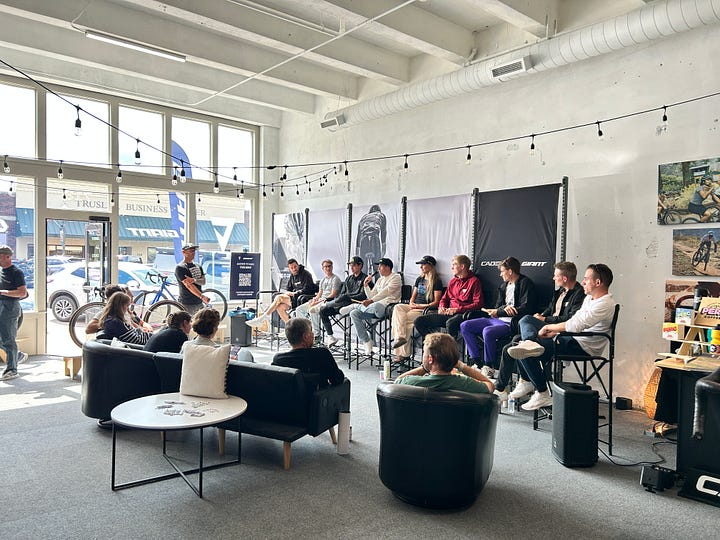
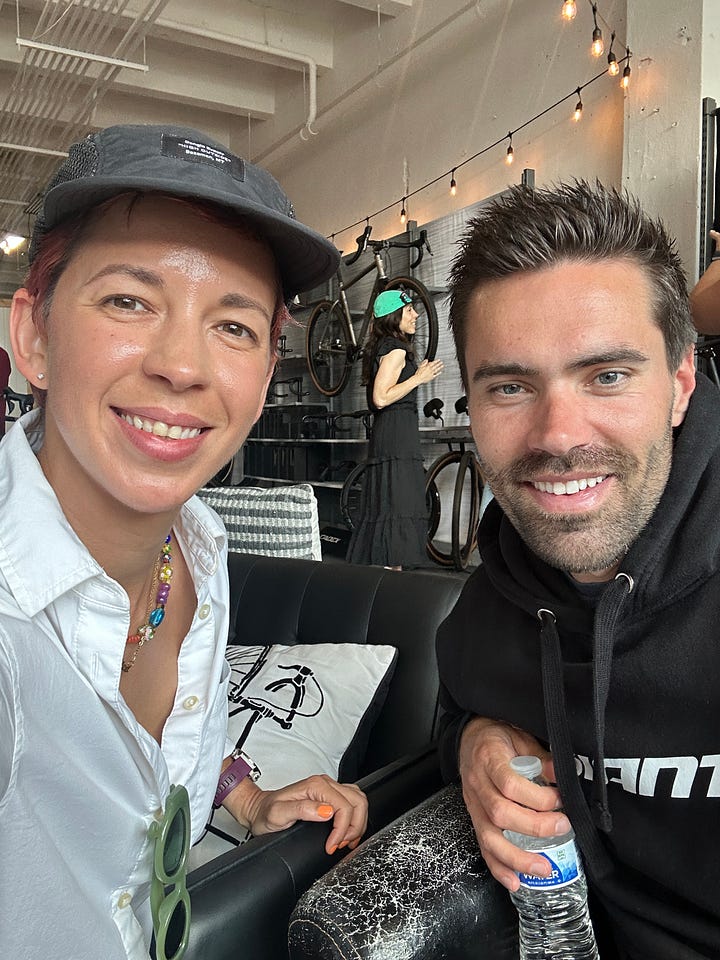
The job
Working for CyclingNews is fast-paced but collaborative. The editors, spread across the U.S., Europe, and Australia, check in via WhatsApp throughout the day. We pitch ideas, file on the fly, swap race updates, and chase down quotes like a hive mind. Compared to freelancing on spec, it felt structured and steady. I knew what was expected. I had backup. I was part of a team again—even if that team was scattered across three continents and six time zones.
That afternoon, I walked over to the Factor Bikes pop-up to interview another WorldTour veteran: David Millar. My original plan had been to catch Cecily Decker and Morgan Aguirre from Pas Normal Racing, but only Morgan was reachable, and not until later that evening. A gentle reminder that nothing ever goes to plan during race week. I’d landed in Kansas with a clean schedule, but this work always requires improvisation. So I pivoted.
Millar, as ever, was candid and composed. There was something about the way he looked and carried himself—lean, sharp-eyed, dryly amused—that reminded me of Billy Bob Thornton in Fargo, season one. Not ominous, but quietly magnetic. He spoke about showing up to Unbound not for a comeback, but for an experiment in suffering—an excuse to ride hard, test Factor’s new gravel prototype, and tackle something unfamiliar with friends.
“It’s got nothing in common with my career as a pro road racer, which is what makes it fun,” he said. “It gives me permission to do it—I’m not coming back to my world. It’s a completely different sport.”
We also talked about bike design, retirement, and how gravel in the U.S. feels “more natural, more relaxed” than its often over-curated European counterpart.
The Pas Normal house was a short drive away. Morgan Aguirre greeted me barefoot. She was laid-back, a little shy at first, but funny and quick once she warmed up. She spoke with a kind of grounded curiosity, confident but still figuring it out.
“I never thought I’d call myself an athlete,” she said. “But now I’ve got muscles I didn’t know existed—and they work. They get me where I want to go.”
She talked about finding cycling late, how her dad’s marathon training had sparked something in her, and how surreal it still feels to line up next to riders with far more experience.
“My least favorite question from my coach is always: ‘How do you feel?’” she joked. “I don’t know! I’ve never been good at that.”
Still, she was determined. After a DNF in her Unbound debut, she was back with a mix of nerves and resolve. “There’s so much unknown,” she said. “And that’s kind of the whole point.”
We wrapped the interview just before dinner, and I left feeling energized, not because the day had gone to plan, but because it hadn’t, and yet the stories still showed up.
That night, I had dinner with Cassondra Spring, my former Uplift mentor and current Liv marketing wizard. We talked bikes and branding, astrology and dating, the bluntness of the Dutch, and what it really means to build a life and career inside a niche you genuinely love. It was grounding. Generous. Exactly what I needed before things ramped up.
Back at the sorority house, I took a shower, climbed into the lower bunk, and set my alarm. My roommate Izzy was a no-show, which meant I had the room to myself—a small luxury during a packed race weekend. For a moment, I considered sleeping on the top bunk just for fun, but decided against risking a ladder mishap and showing up to work with a limp. Instead, I queued up Frasier on PlutoTV for comfort—a ritual I’d adapted from my old racing days, when Gilmore Girls was my pre-race sedative of choice.
It hadn’t even been a particularly long day, but already I felt like I was living two lives at once: fan and reporter, outsider and insider. And it was only Thursday.
Friday: Deadlines, Media Madness, and the Sea of Gravel Dreams
Friday started with coffee and a simple breakfast at the sorority house, shared sleepily with a few riders whose excitement for race day continued ramping up. Then I headed downtown to meet Melisa Rollins, who rides for the Liv Cycling Collective and somehow lined up at Sea Otter just six weeks after fracturing both wrists. We sat on a couch inside the Liv pop-up on Commercial Street, watching shakeout rides roll past while she sipped coffee and chatted casually, not like she was about to race 200 miles in the Kansas heat the next day.
Rollins is thoughtful, composed, and just nerdy enough about gear to be completely charming. She told me about trimming the side knobs off her tires to save 65 grams—“I’m lightweight now,” she joked—but she balances that attention to detail with a deep sense of purpose. “I always feel pressure,” she admitted. “But it doesn’t feel external. The team just wants me to have my best day, whatever that looks like.”
She talked about her love for the sport, her history at Unbound, and how much the course—and the race’s aura—still intimidates her, even after a fifth-place finish in 2022. “It kind of killed me that year,” she said. “It was my best result, but also what led to the hardest part of my season. So this year, I wanted to come in with more respect.”
Rollins isn’t chasing validation anymore. She’s after depth, durability, and the kind of growth you only get when you push yourself to the edge of what’s possible. As we finished up and she headed off for one more spin, I was left with a simple impression: she’s not just ready to race. She’s ready to own the space she’s earned. You can read the full interview here: Melisa Rollins Has Unfinished Business at Unbound 200.
Before the next round of deadlines, I wandered through the expo and ran into two of my favorite humans: Dominique Powers and Ken Rodriguez-Clisham. We swapped hugs and travel stories, laughed for a minute, and then disappeared back into the race-week hustle.
A Media Meeting and a Side of Ceaser Salad
The media presence at Unbound seems to grow every year. By noon, the Emporia Arts Center was packed with about 160 of us—journalists, podcasters, YouTubers, local news crews, photographers—spread out at round tables and folding chairs, scribbling notes on photo zones, comms protocols, and start-line etiquette.
Afterwards, I finished my Morgan Aguirre and David Millar’s stories and submitted them to my editors before heading out for some lunch.
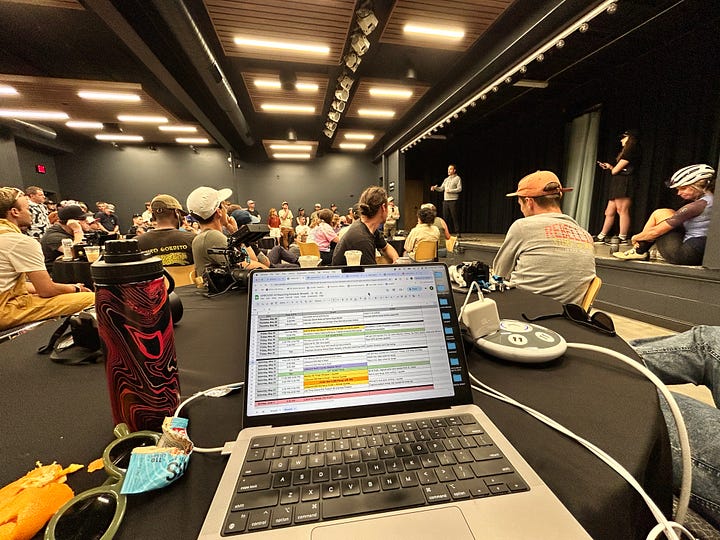
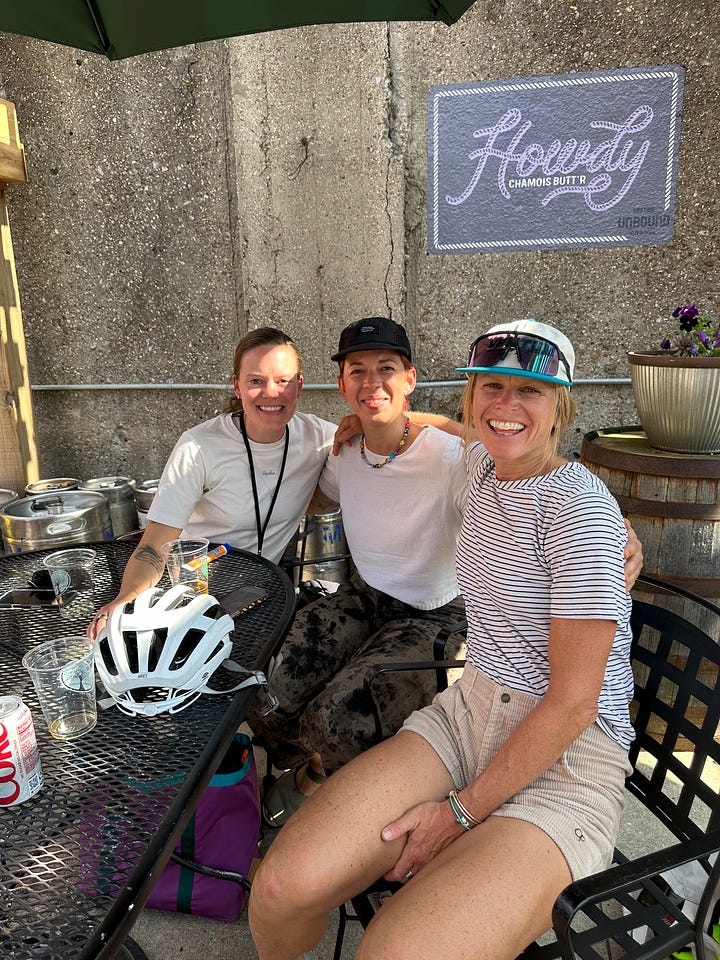
I grabbed a surprisingly great tofu bánh mì from the Vietnamese food truck tucked in the alley behind Mulready’s, the unofficial bar of the weekend. The truck was run by a crew of hipster-looking kids with bandanas, ironic mustaches, and an enviable sense of I-do-not-care. The sandwich was crispy, spicy, and fresh. Then I made my way to the Unbound XL start line to try and catch Lael Wilcox. She was nowhere to be found—until suddenly she was, front and center, calm as ever. It felt like spotting Carmen Sandiego in a sea of aero helmets and hydration packs. I had about 20 seconds. I asked two questions. She gave two very brief answers. I sent them in anyway. Sometimes, that’s the job.
By 5 p.m., I was fried. I met up with journalist Betsy Welch and CyclingWeekly editor Anne-Marije Rook at Mulready’s for cold beer and shop talk—rider lists, the joys (and chaos) of freelancing, the state of cycling media. Then it was back to the sorority house, where dinner was served dorm-style: a spaghetti-meat-cheese-sauce casserole, with Caesar salad and breadsticks on the side. It was confusing. It was humble. It was perfect.
After dinner, I grabbed a brownie from the dessert table and headed to my room. I laid out my clothes, prepped my gear, and set my alarm for the early wake-up call. I really did try to sleep. But the walls were thin, and every sound—from someone tossing and turning to the chorus of 3 a.m. alarms—filtered in like static. I’d hoped for seven hours. I got maybe three or four, broken into restless half-hour chunks. Still, the buzz in the house was contagious. We were all breathing in sync, nervous, excited, and wide awake long before we ever meant to be.
I woke up at 3:58 a.m., beating my alarm by two minutes. The day was already waiting.
Saturday: Start Lines, Finish Lines, and Emotional Whiplash
I miscalculated the start time and showed up at the media center at 4:30 a.m. (for a 5:50 a.m. race start)—too early, even for Unbound. But the quiet moments are sometimes the most grounding. I chatted with the Life Time staff while we waited for the doors to unlock, the sky still navy and heavy above us.
At the café next door, a woman ahead of me in line turned, smiled, and said, “For all the hard work,” before buying my coffee. A small gesture that I took as a good omen.
Pre-Race Craze
At the 200-mile start line, I waded through a sea of blinking lights and silhouetted helmets, trying to identify pros in the dark by their kits, socks, and vibes. I snagged quotes from Tim Declercq, Lauren Stephens, Sara Sturm, and a cologne-drenched Belgian whose scent still haunts me. I tried to grab quotes from Greg Van Avermaet, but he was weaving through the crowd with two other teammates, clearly on a mission.
After the elite 200-mile fields rolled out, there was a brief moment of calm. I grabbed a snack and wandered toward the back of the next wave staging up. That’s where I found Fred Schmid, the 92-year-old I’d profiled for Cycling Weekly, standing beside his wife, Suzanne. He was calmly fiddling with his Garmin and unwrapping a bar, all quiet focus. “It’s always nice to put a face to the voice,” he said warmly.
Suzanne looked me over and smiled. “You look just like your iPhone emoji,” she added. And I took it as the highest compliment.
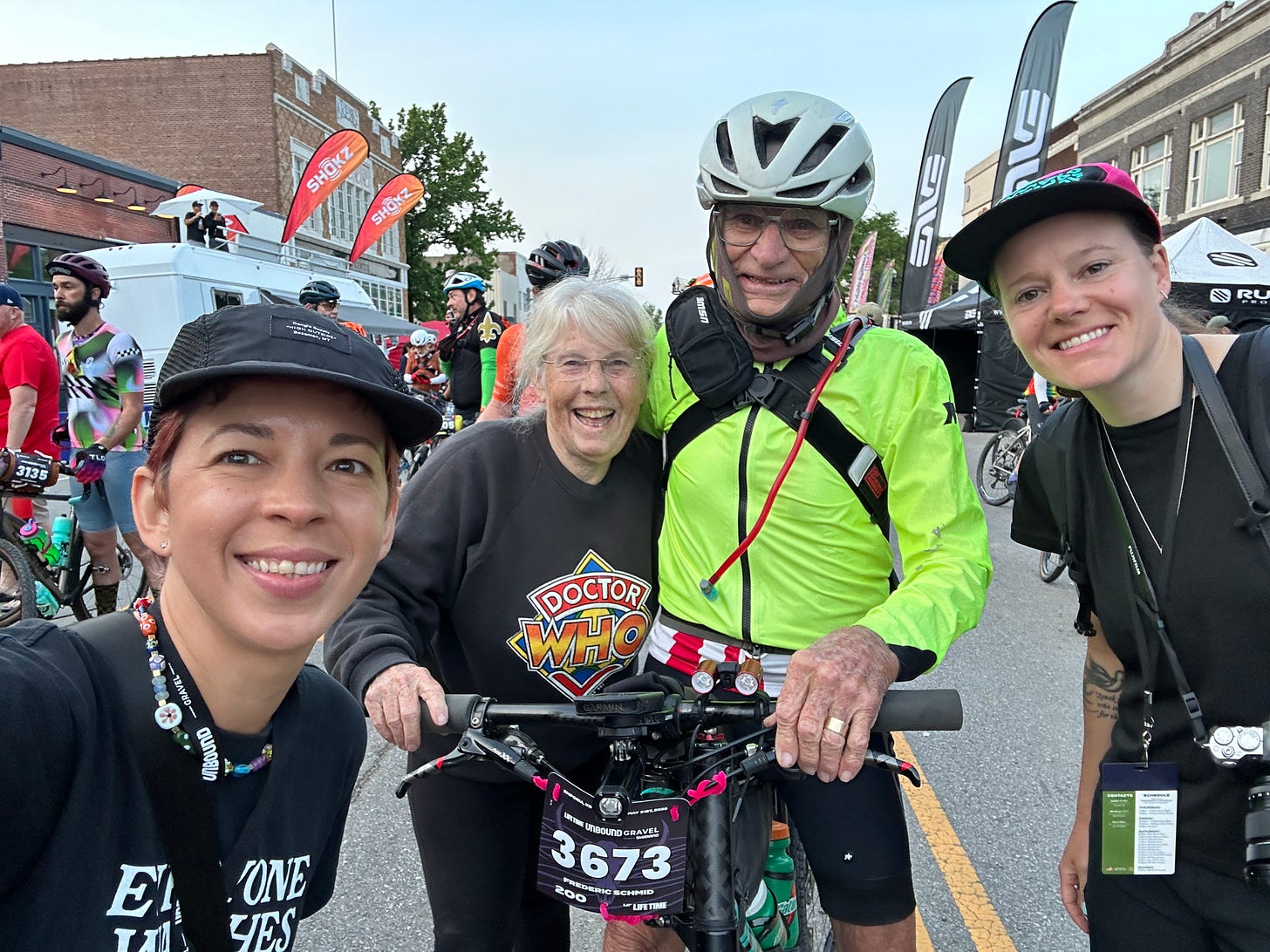
The Media Room Hustle
Back at the media center, the pace of the race picked up. We had the live stream projected on the screen, and—for the first time in gravel history—it actually looked great: fluid visuals, clear commentary, timely updates. A massive step forward.
We toggled between trackers, team feeds, text threads, and social media, trying to piece together the story unfolding on dusty roads dozens of miles away.
“You Are Here Early”
Then came the surprise: the Unbound XL riders were way ahead of schedule. On the live tracker, we watched a back-and-forth chase between Rob Britton and Lachlan Morton, assuming Morton was still leading and would roll down Commercial Street at any moment. But by 9 a.m., to everyone’s surprise, it was Britton who crossed the line first, finishing in 17 hours and 49 minutes and obliterating the course record by more than two hours.
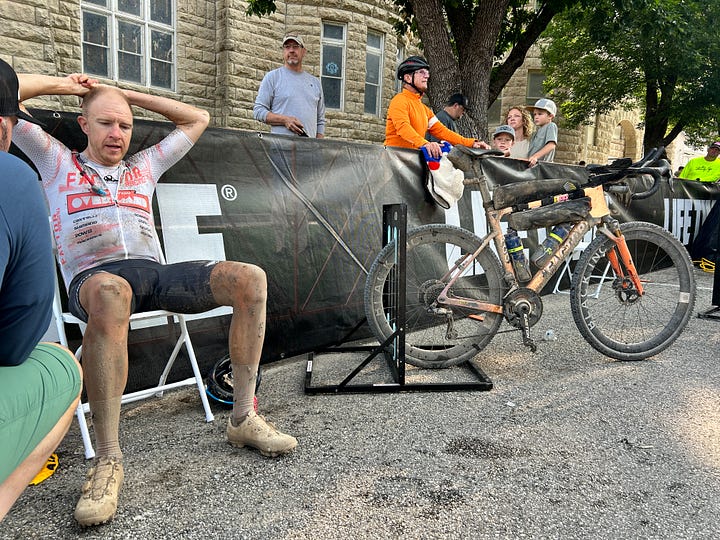
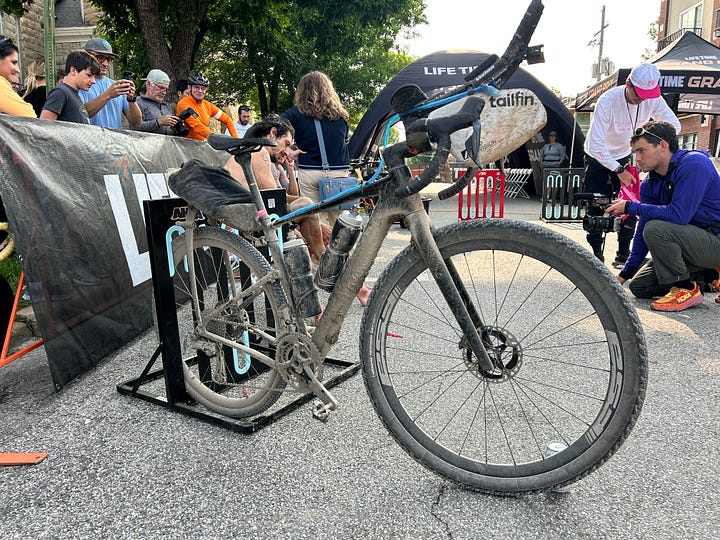
Just minutes later, Morton arrived cracked, glassy-eyed, and caked in grit. An EF team staffer gently peeled off his socks while he sat motionless on the curb. I waited nearby, gave him a moment, and then asked softly if he was ready to talk. He nodded.
“Eating and drinking were hard. I had everything on me, but my stomach just stopped absorbing,” Lachlan said, his voice slow and distant, like time hadn’t quite sped back up since getting off the bike. “Still… it was one of the best battles I’ve had on a bike. It became this really crazy, unique experience.”
Britton, who had chased him for more than 200 kilometers, didn’t mince words: “Everybody’s beatable. I think his wheels kind of came off a bit. We were both just totally f**ed.”
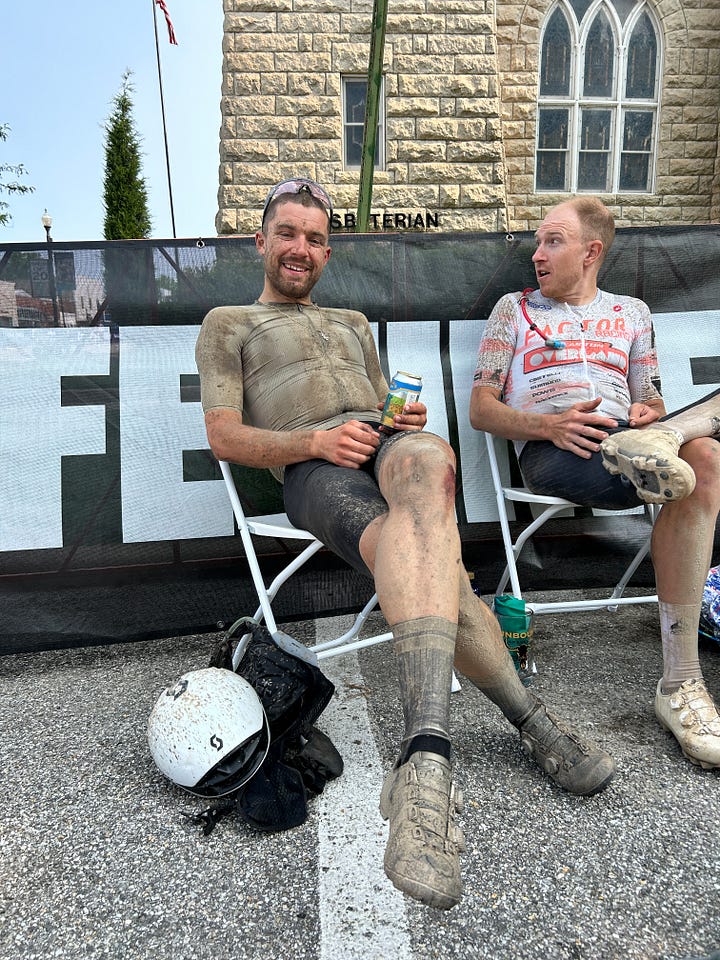
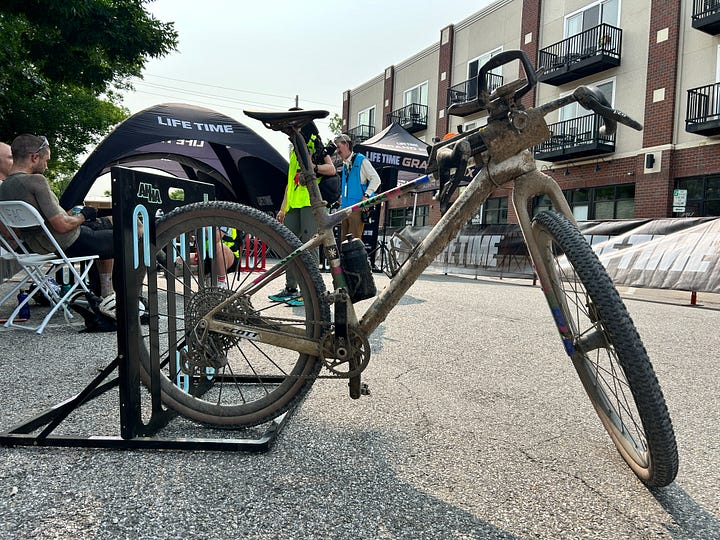
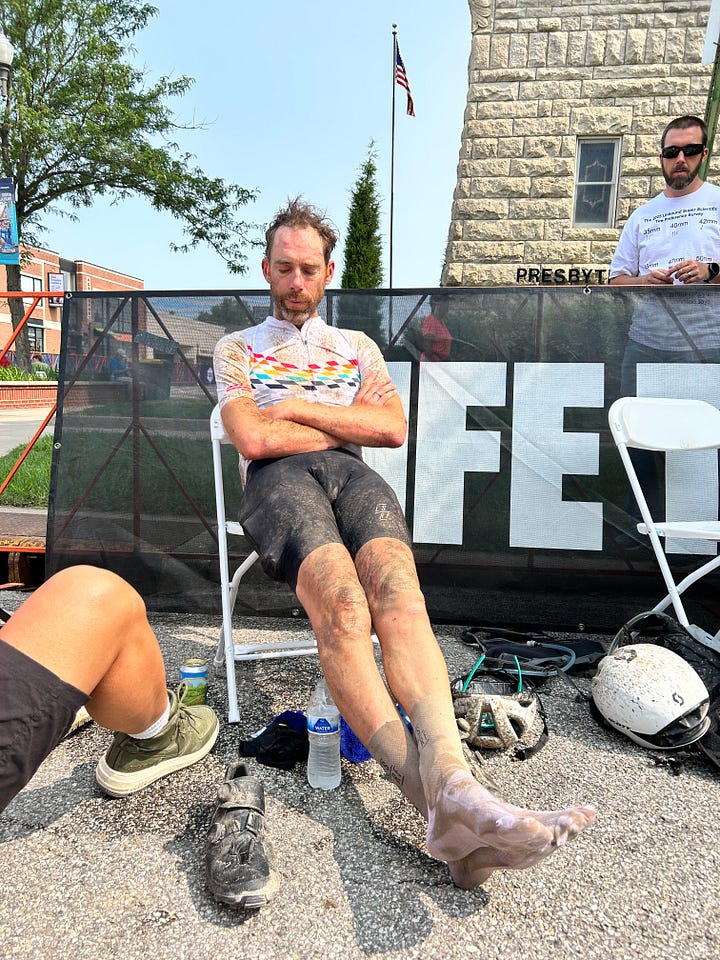
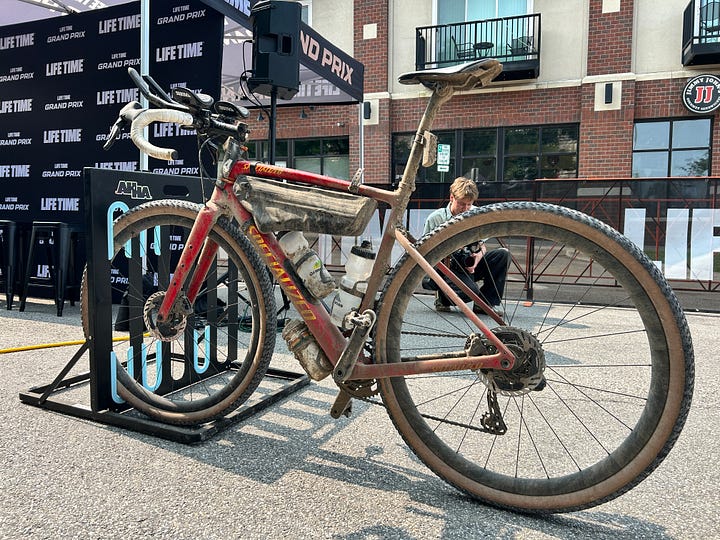
Robin Gemperle, the 29-year-old Swiss ultra guy, came in third. He laughed about going solo most of the way. “I didn’t bring enough water, lost a bottle early... but it worked out. So many people out there are having the time of their lives,” he said.
Then came Laurens ten Dam, dust-caked and grinning, gravel’s philosopher-poet: “We were doing pulls at 50k an hour into the night. I told the guys, ‘F**king no fear!’ That’s what I love about events like this—you find your fellow madmen.”
Heather Jackson Did That
While we were still catching our breath from Britton and Morton’s duel, Heather Jackson quietly dropped another ride for the XL record books. The former Ironman star and Princeton hockey player turned gravel racer smashed the women’s course record by more than 90 minutes and placed eighth overall.
But her 20-hour ride wasn’t all smooth. Her headlamp died. She couldn’t shift. She crashed. She thought her bike might be broken. “Oofff, what didn’t happen out there?” she said at the finish. “I never wanted to see a sunrise more.”
Still, she held it together, riding solo through the night and into the Kansas dawn. “It was so epic,” she said. “That was a journey. And I’ve done long things.”
And Then the 200s Blew In
Just as we hit send on that story, the men’s 200-mile race hit its final act. Cameron Jones, 23 and racing for a Life Time Grand Prix wildcard, broke away from John Borstelmann and held on to win solo.
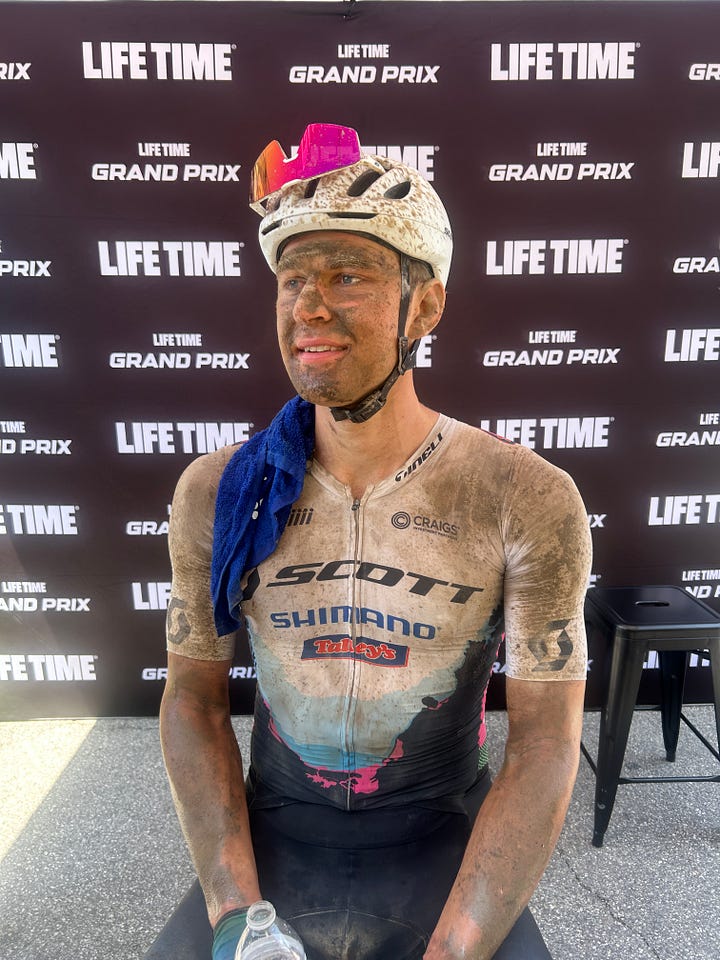
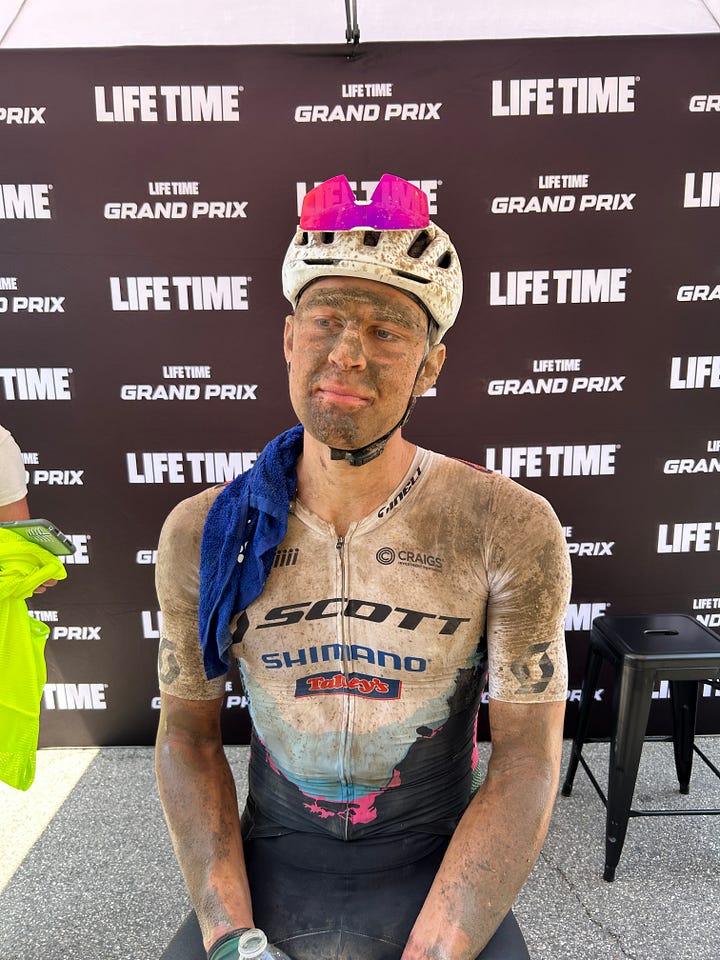
“Every time I sat down, I thought, who am I kidding? I always race like there’s nothing to lose,” he said. “It worked out this time.”
The women’s finish was equally chaotic. Carolina Migon (Pas Normal) launched a late solo attack from a small breakaway to take the win, while her teammate Cecily Decker and reigning champ Sofia Gomez Villafañe sprinted for the final podium spots. Last year’s winner, Rosa Klöser, heartbreakingly, made a wrong turn just before the finish and lost her shot, but when I caught her later, she was already laughing. “I’ll just have to come back next year,” she shrugged.
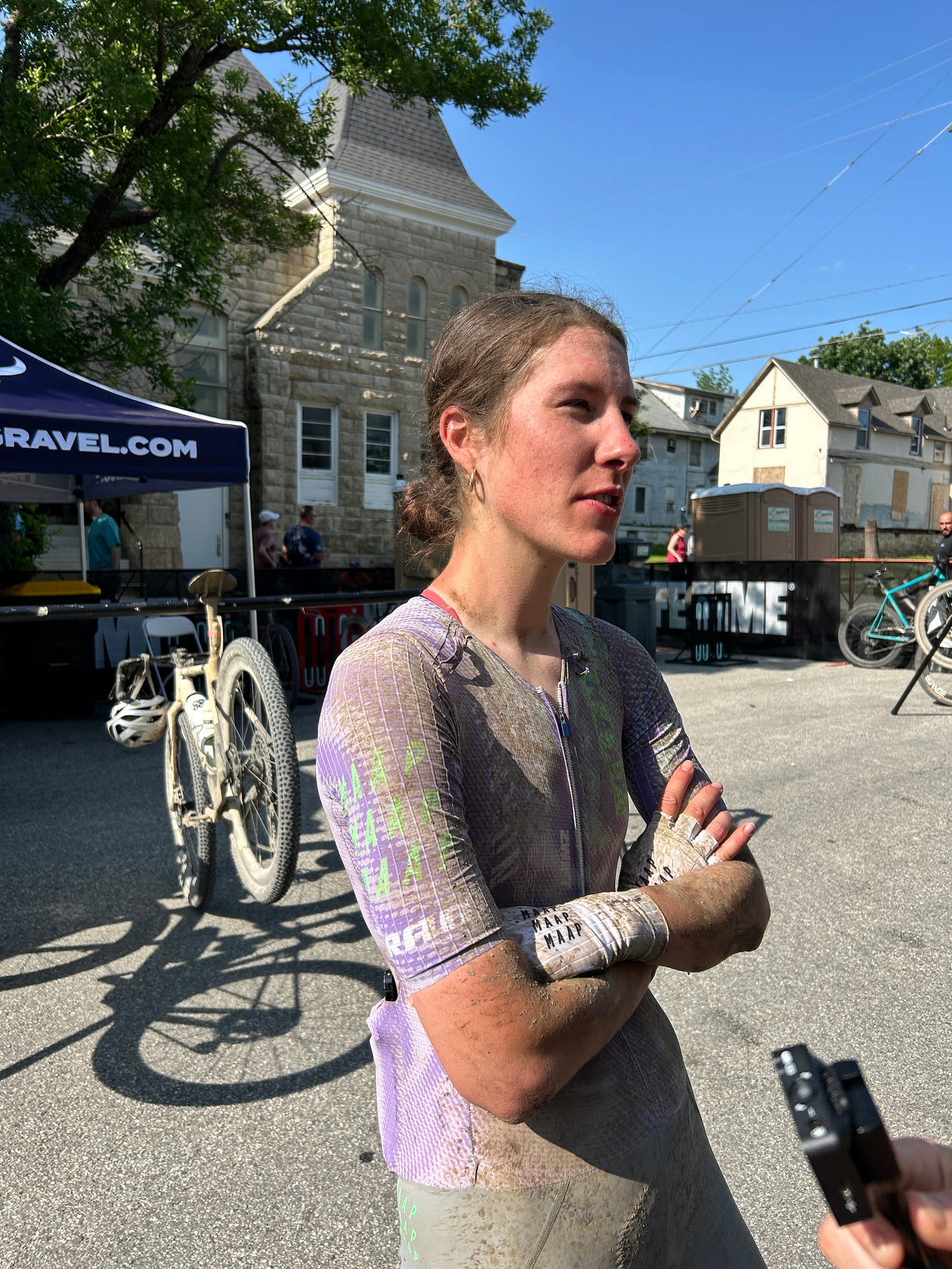
Something Shifts
So much more happened that Saturday, but trying to recall it all feels like untangling a post-race gear bag—mud-caked, sweat-soaked, and full of things you forgot you packed. As the final finishers rolled in and the media scrum thinned out, I realized just how fast the day had flown. Fourteen hours had passed in a blur of quote-chasing, tracker-refreshing, and filing on the fly. It was a whirlwind.
There’s no way to fit it all here. For the full play-by-play, you’ll have to read the CyclingNews coverage. But somewhere in that blur, something shifted.
All weekend, when I introduced myself to riders and staff, they didn’t ask who I was. Instead, I heard: “We met at Sea Otter,” or “I read your story this morning.”
After years of writing and quietly trying to earn my place, I felt something unfamiliar but welcome—a flicker of recognition. A sense of belonging.
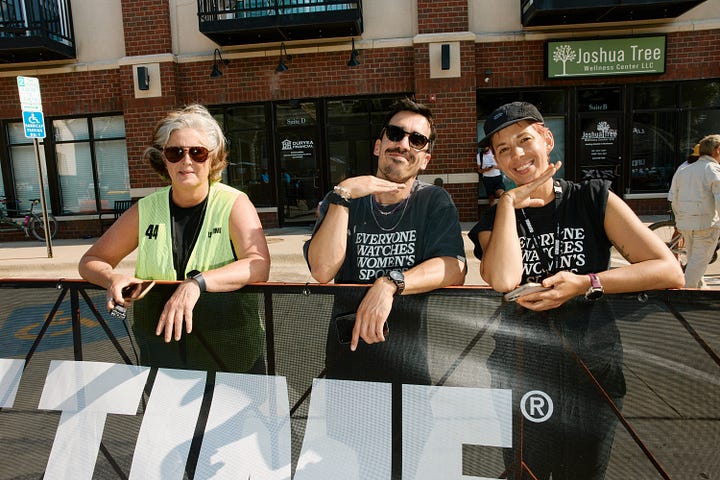
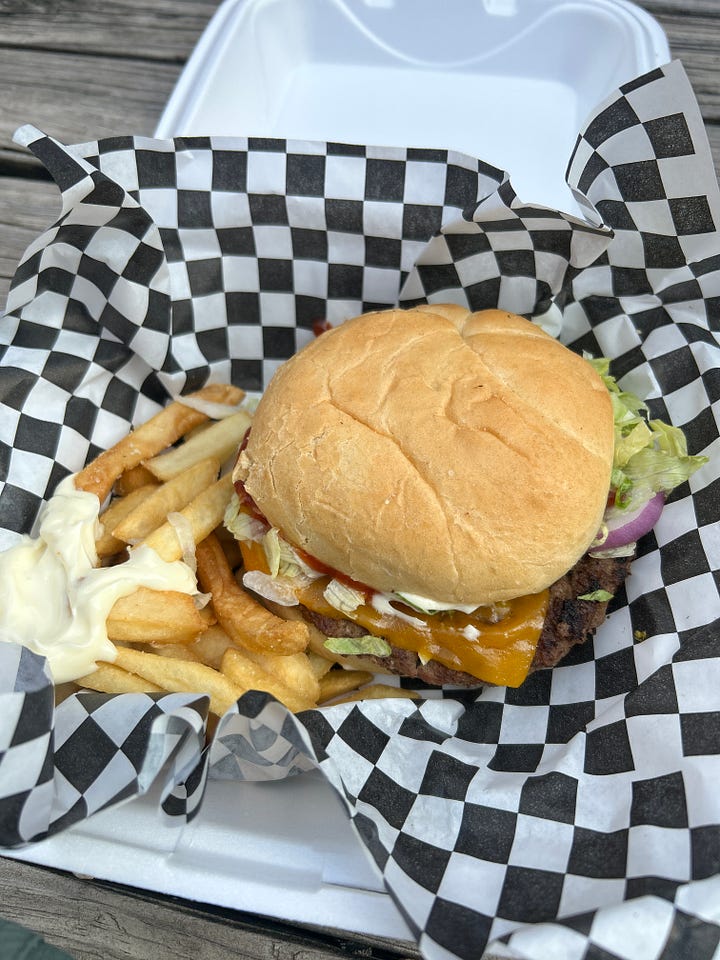
Collapse, Rocky Style
Somewhere between my sixth story and third Clif Bar, the sun dipped low, and my body finally gave in. Work was now over, and for dinner, I grabbed a quick burger from another food truck.
Back at the sorority house, the staff and a few guests were still camped out on the porch. Every time someone returned from the race, whether 14 or 21 hours in, they blasted the Rocky theme song and clapped them in.
It was adorable. It was exhausting. And, as racers continued to arrive through the night, it woke me up at least three times. But I couldn’t be mad.
Sunday: The Long Way Home
On Sunday morning, I left the sorority house after breakfast and flew home without issue—unlike poor Josh, whose bags vanished somewhere in the O’Hare triangle. My partner, Paul, picked me up from the airport, but missed the exit home, so we ended up taking the long way through Philly. As we passed the Museum of Art, I caught myself humming Gonna Fly Now, laughing at how much of this race had followed me home.
The drive felt symbolic. I had left Philly tired and uncertain. I came back feeling… ready. Ready for more of this work. Ready to keep building. Ready to keep showing up.
Unbound isn’t just a gravel race. It’s a proving ground, a reunion, a launchpad, a mirror. Everyone grows with it, the riders, the volunteers, the fans, and yes, even the journalists.
I’ve never raced it myself, but every year the temptation grows. Maybe I will. Maybe I won’t. But I know I’ll be back, press pass in hand and recorder rolling. Because I love this work. The 14-hour days. The ache in my neck. The cold coffee. The chaos of finding Lael Wilcox in a sea of Lycra.
It’s not glamorous. But it’s mine. And I’ll keep showing up for it, year after year.

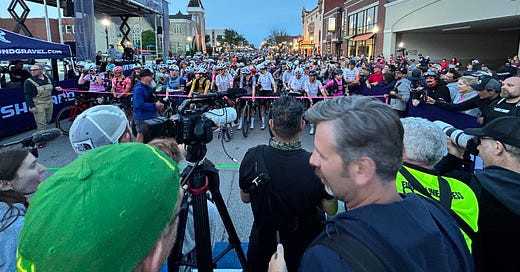







Incredible story telling! As an emporia resident and ESU employee, I do want to correct your early assumption that the sorority house is for the University of Kansas - it’s actually for Emporia State University!